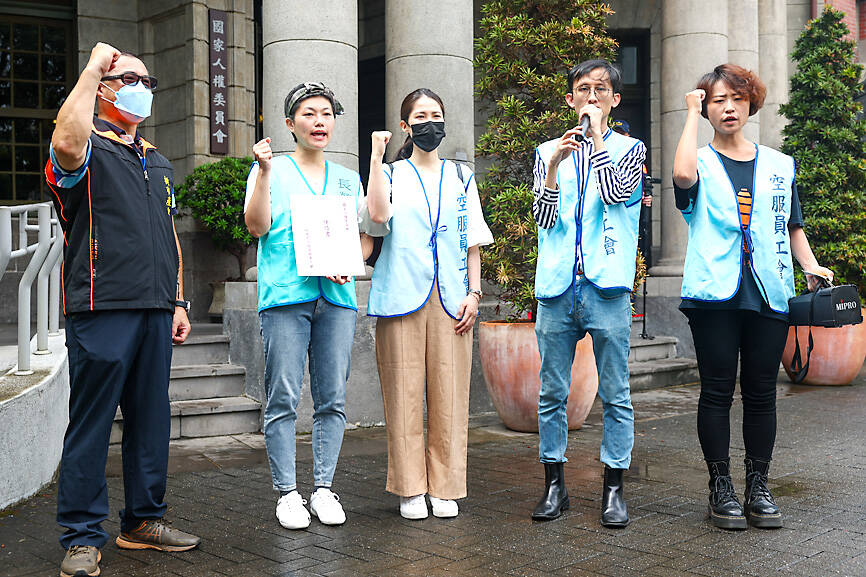Dress code and appearance requirements for female flight attendants are discriminatory and lag a decade behind other nations, the Taoyuan Flight Attendants’ Union said yesterday, as it petitioned the National Human Rights Commission to set clear rules to prevent gender discrimination in the airline industry.
China Airlines, EVA Airways and Starlux Airlines all require female flight attendants to wear pencil skirts, and have rules on makeup and grooming, union executive director Lin Yu-chia (林昱嘉) said while delivering the petition to the commission in Taipei.
Attendants can wear pants during annual safety training, but must wear pencil skirts, high heels and stockings when on duty, which would hamper their ability to respond in an emergency, Lin said.

Photo: Lin Hui-chin, Taipei Times
Gender-neutral uniform options are the norm globally and should be mandated by the commission, she added.
Additionally, although most flight attendants at EVA and China Airlines are women, many return from maternity leave to find that their seniority or performance gains have restarted, they have difficulty getting promotions and some are assigned unreasonable shifts, Lin said.
This unfair treatment makes many flight attendants hesitant to apply for maternity leave, she said.
The reason Taiwanese airlines lag behind other nations in gender equality is because they look at their flight attendants as a product, EVA Air Union chairperson Lee Ying (李瀅) said, adding that the designer who redesigned China Airlines’ uniforms even said they should “be evocative.”
Although people are now paying more attention to gender equality in the workplace, regulations need to be enforceable to keep companies from circumventing them, she added.
The Executive Yuan likes to say that Taiwan leads Asia on gender equality, but its airlines lag far behind its international peers, union secretary-general Chou Sheng-kai (周聖凱) said.
A decade ago, in 2013, Asiana Airlines was the last airline in South Korea to still require its female flight attendants to wear skirts, Chou said.
That same year, the National Human Rights Commission of Korea declared the rule discriminatory, requiring the airline to provide gender-neutral options, he said.
Yet all of Taiwan’s major airlines still maintain this requirement, which is not only highly discriminatory, but runs counter to the spirit of the UN’s Convention on the Elimination of All Forms of Discrimination Against Women, he added.
The Executive Yuan in 2014 determined a similar rule among police to be discriminatory, he said, calling on the commission to do the same for flight attendants.

Taiwanese can file complaints with the Tourism Administration to report travel agencies if their activities caused termination of a person’s citizenship, Mainland Affairs Council Minister Chiu Chui-cheng (邱垂正) said yesterday, after a podcaster highlighted a case in which a person’s citizenship was canceled for receiving a single-use Chinese passport to enter Russia. The council is aware of incidents in which people who signed up through Chinese travel agencies for tours of Russia were told they could obtain Russian visas and fast-track border clearance, Chiu told reporters on the sidelines of an event in Taipei. However, the travel agencies actually applied

Japanese footwear brand Onitsuka Tiger today issued a public apology and said it has suspended an employee amid allegations that the staff member discriminated against a Vietnamese customer at its Taipei 101 store. Posting on the social media platform Threads yesterday, a user said that an employee at the store said that “those shoes are very expensive” when her friend, who is a migrant worker from Vietnam, asked for assistance. The employee then ignored her until she asked again, to which she replied: "We don't have a size 37." The post had amassed nearly 26,000 likes and 916 comments as of this

New measures aimed at making Taiwan more attractive to foreign professionals came into effect this month, the National Development Council said yesterday. Among the changes, international students at Taiwanese universities would be able to work in Taiwan without a work permit in the two years after they graduate, explainer materials provided by the council said. In addition, foreign nationals who graduated from one of the world’s top 200 universities within the past five years can also apply for a two-year open work permit. Previously, those graduates would have needed to apply for a work permit using point-based criteria or have a Taiwanese company

The Shilin District Prosecutors’ Office yesterday indicted two Taiwanese and issued a wanted notice for Pete Liu (劉作虎), founder of Shenzhen-based smartphone manufacturer OnePlus Technology Co (萬普拉斯科技), for allegedly contravening the Act Governing Relations Between the People of the Taiwan Area and the Mainland Area (臺灣地區與大陸地區人民關係條例) by poaching 70 engineers in Taiwan. Liu allegedly traveled to Taiwan at the end of 2014 and met with a Taiwanese man surnamed Lin (林) to discuss establishing a mobile software research and development (R&D) team in Taiwan, prosecutors said. Without approval from the government, Lin, following Liu’s instructions, recruited more than 70 software